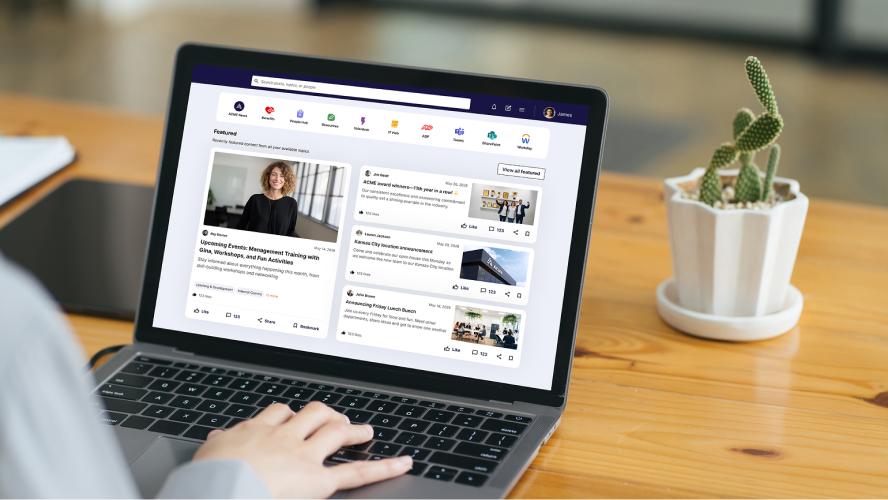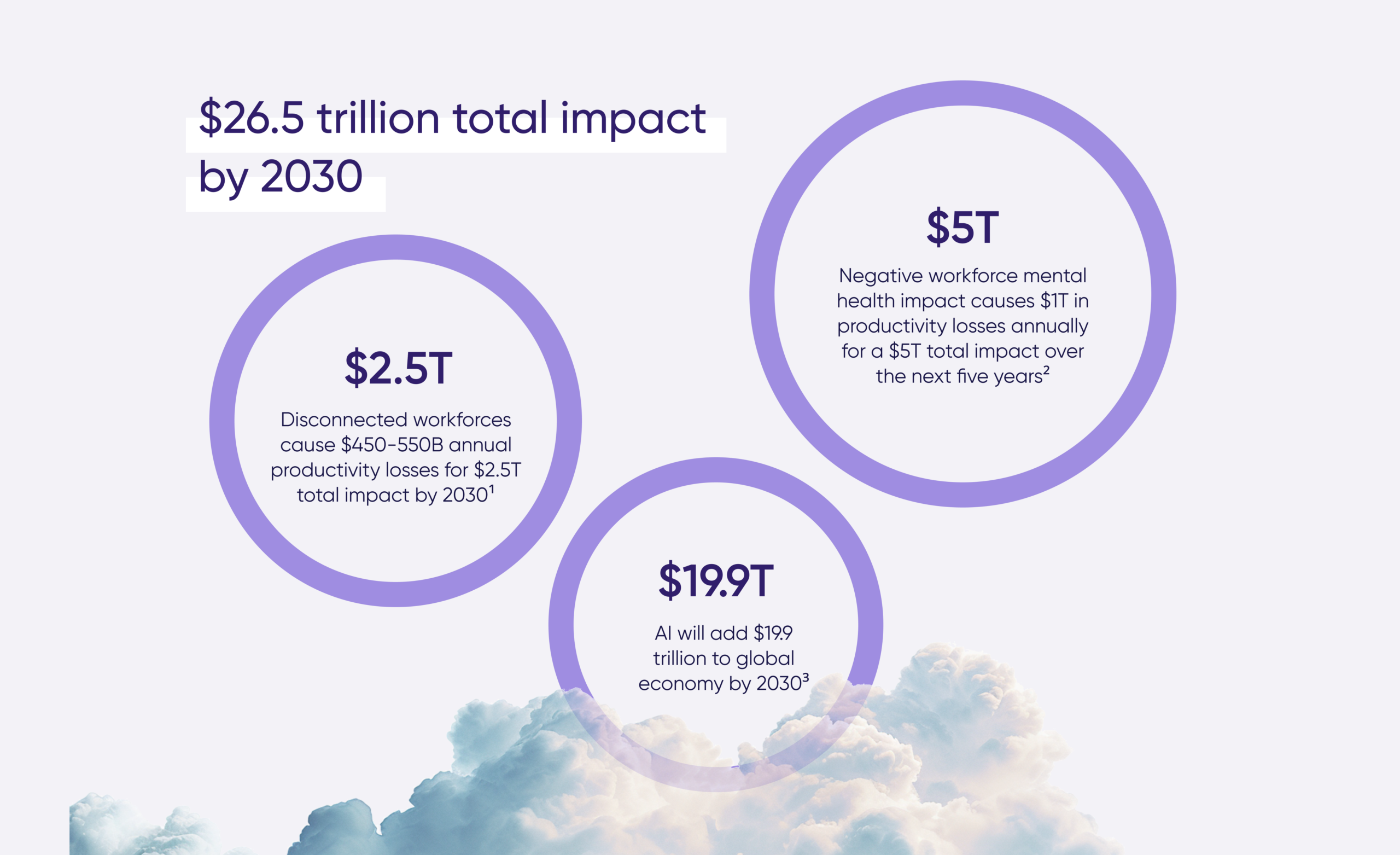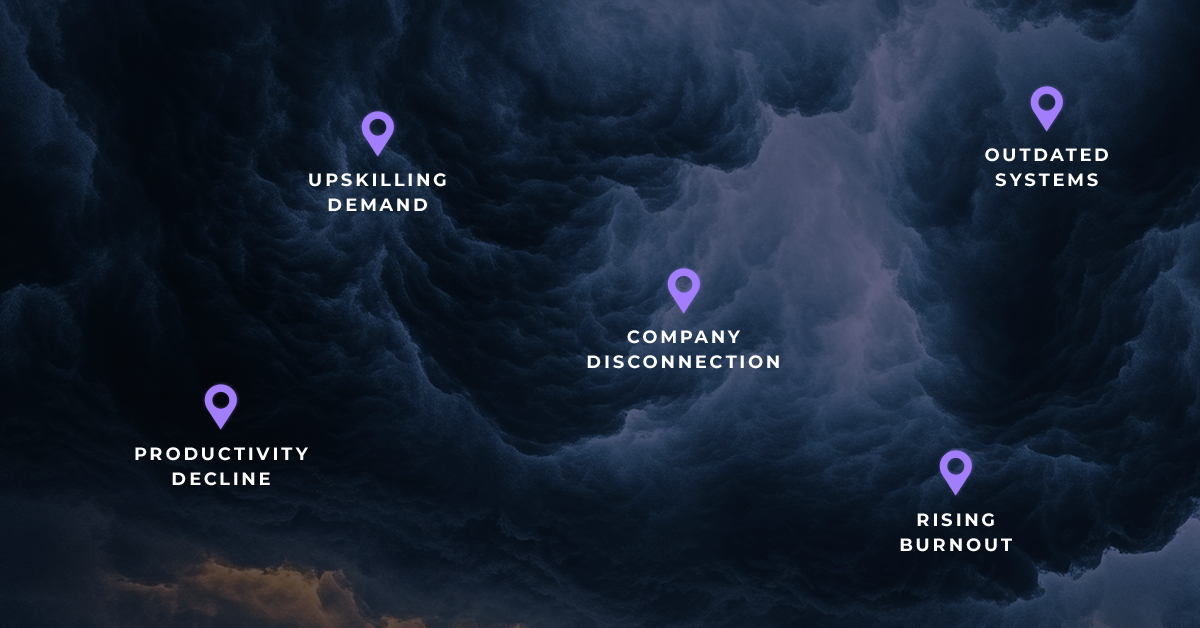Table of Contents
In the rapidly evolving landscape of modern workplaces, HR professionals and People teams face myriad challenges that impact the employee experience and ultimately, employee engagement. From the need to communicate effectively with new employees to navigating the complexities of remote and hybrid work arrangements, HR teams are tasked with attracting, training, and retaining top talent in a VUCA (volatile, uncertain, complex, and ambiguous) world. Amid these challenges, the ultimate goal remains the same: to craft an exceptional employee experience that drives positive employee engagement.
Employee engagement is not just a buzzword—it holds significant sway over a company’s success. The results of poor employee engagement can reverberate throughout the organization, resulting in lost productivity, higher turnover rates, increased sick days, and diminished customer service. In fact, Gallup estimates that disengaged employees cost U.S. companies a staggering $400-$500 billion annually. On the flip side, high levels of employee engagement can lead to improved retention rates, heightened productivity, better sales performance, and enhanced customer service, ultimately boosting the bottom line.
To underscore the financial impact of disengagement, consider this: disengaged employees can cost their companies up to 34% of their salary. For the average business, this translates to a loss of at least $2,246 for every disengaged employee. What’s even more alarming is Gallup’s estimate that only 15% of employees are actively engaged, further highlighting the pressing need to address this issue.
So, how do companies bridge the gap and nurture a highly engaged workforce?
The answer lies in effective communication. Numerous studies have established a strong link between positive organizational communication satisfaction and a favorable employee experience, ultimately leading to increased engagement levels. This connection was validated by a study I conducted a few years ago, which revealed a positive correlation between communication satisfaction and employee engagement.
Taking this concept a step further, I collaborated with Shira Hirsh, our amazing Firstup Strategy Director, Insights & Analytics, to delve into the relationship between communication engagement and company performance. By analyzing data from the 2022 Firstup communications platform alongside quarterly and annual company engagement survey data, we discovered promising findings. There was a clear positive correlation between communication engagement and the company’s employee net promoter score (eNPS). In essence, employees who engaged more actively with the communications platform were also more likely to promote the company.
Similarly, a positive correlation was observed between communication engagement and employee engagement scores. Teams that displayed higher engagement scores were not only more engaged with the platform, but they also exhibited a whopping 99% more comments on communications. This surge in two-way communication is especially crucial given the rise of remote and distributed workforces.
A third study conducted in partnership with OneModel focused on the impact of Firstup 2022 communication engagement scores and 2022 attrition rates. The findings revealed that effective communication was a very strong indicator of retention. Employees who interacted more frequently with communications and content published and delivered via Firstup— demonstrated by clicks, likes, and shares—were notably less likely to leave the company. This underscores the pivotal role that communication plays in fostering engagement, retention, and productivity. OneModel will be presenting its full study in an upcoming whitepaper and at Attune ’23, the Firstup employee experience event.
However, it’s vital to note that achieving effective communication in today’s global, fast-paced, noisy world is no small feat. It takes more than sending an email or holding a team huddle. This is where the concept of intelligent, data-driven communication comes into play. HR professionals need a strategic approach that leverages data-driven insights to provide personalized and authentic communication that resonates with employees at scale. While HR professionals are responsible for driving engagement, there is no way to personalize the employee experience for every employee without relying on automated and intelligent processes. The goal is to create meaningful connections at scale.
That’s where Firstup comes into play. By utilizing our AI-driven, omnichannel communication platform, HR professionals can design moments that matter across the employee journey, connect employees to HR systems and resources, streamline the frequency and relevance of content, and provide intelligent data to spot and act upon engagement problems before they arise.
The connection between intelligent, data-driven communication and employee engagement is undeniable. In an era where employee engagement can make or break a company’s success, the role of effective communication cannot be overstated. The evidence from these studies is clear: when companies invest in communication technology and strategies that break through the noise and foster authentic connections, they reap the rewards of increased engagement, retention, and overall organizational success.
When communication is data driven, you control the outcome
Table of Contents
Related posts
Subscribe via Email
Subscribe to our blog to get insights sent directly to your inbox.
Related posts

Sign up to receive the latest news and resources from Firstup
Firstup delivers personalized communication and data insights to improve the employee experience at every moment that matters




